弗朗西斯.培根《论读书》Of-Studies(译文对比)
Of Study培根论读书原文+翻译
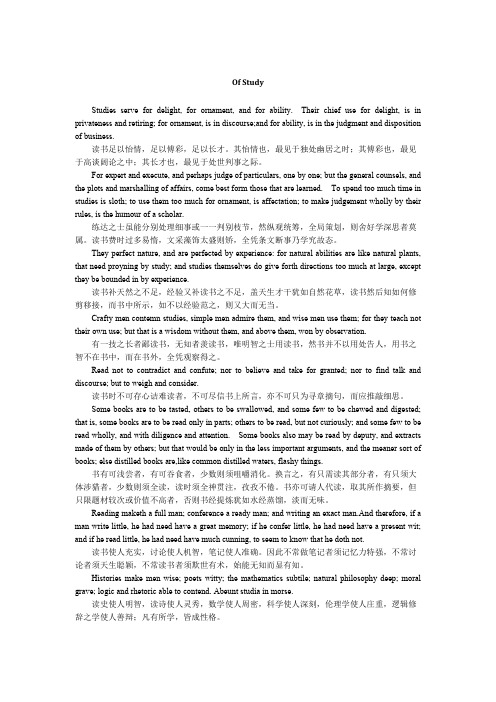
Of StudyStudies serve for delight, for ornament, and for ability. Their chief use for delight, is in privateness and retiring; for ornament, is in discourse;and for ability, is in the judgment and disposition of business.读书足以怡情,足以傅彩,足以长才。
其怡情也,最见于独处幽居之时;其傅彩也,最见于高谈阔论之中;其长才也,最见于处世判事之际。
For expert and execute, and perhaps judge of particulars, one by one; but the general counsels, and the plots and marshalling of affairs, come best form those that are learned. To spend too much time in studies is sloth; to use them too much for ornament, is affectation; to make judgement wholly by their rules, is the humour of a scholar.练达之士虽能分别处理细事或一一判别枝节,然纵观统筹,全局策划,则舍好学深思者莫属。
读书费时过多易惰,文采藻饰太盛则矫,全凭条文断事乃学究故态。
They perfect nature, and are perfected by experience: for natural abilities are like natural plants, that need proyning by study; and studies themselves do give forth directions too much at large, except they be bounded in by experience.读书补天然之不足,经验又补读书之不足,盖天生才干犹如自然花草,读书然后知如何修剪移接,而书中所示,如不以经验范之,则又大而无当。
ofstudy培根论读书原文+翻译
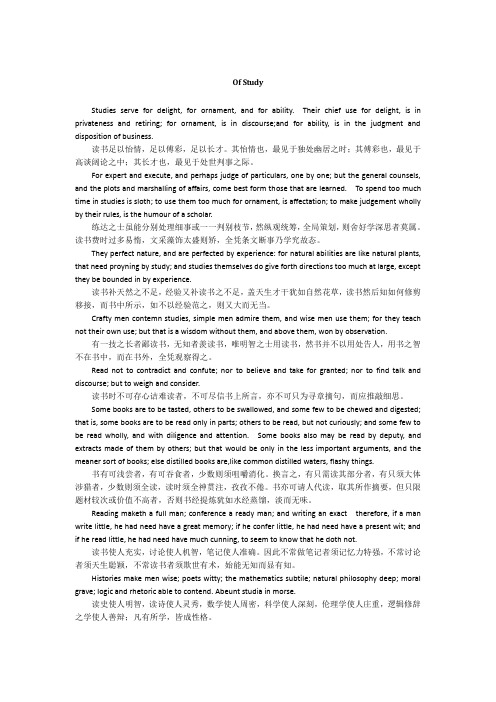
Of StudyStudies serve for delight, for ornament, and for ability.Their chief use for delight, is in privateness and retiring; for ornament, is in discourse;and for ability, is in the judgment and disposition of business.读书足以怡情,足以傅彩,足以长才。
其怡情也,最见于独处幽居之时;其傅彩也,最见于高谈阔论之中;其长才也,最见于处世判事之际。
For expert and execute, and perhaps judge of particulars, one by one; but the general counsels, and the plots and marshalling of affairs, come best form those that are learned.To spend too much time in studies is sloth; to use them too much for ornament, is affectation; to make judgement wholly by their rules, is the humour of a scholar.练达之士虽能分别处理细事或一一判别枝节,然纵观统筹,全局策划,则舍好学深思者莫属。
读书费时过多易惰,文采藻饰太盛则矫,全凭条文断事乃学究故态。
They perfect nature, and are perfected by experience: for natural abilities are like natural plants, that need proyning by study; and studies themselves do give forth directions too much at large, except they be bounded in by experience.读书补天然之不足,经验又补读书之不足,盖天生才干犹如自然花草,读书然后知如何修剪移接,而书中所示,如不以经验范之,则又大而无当。
(完整版)培根的《论学习》中英文对照

Of StudiesFrancis Bacon论学习弗朗西斯·培根王佐良译Studies serve for delight, for ornament, and for ability.Their chief use for delight, is in privateness and retiring; for ornament, is in discourse; and for ability, is in thejudgment and disposition of business. For expert and execute, and perhaps judge of particulars, one by one; but the general counsels, and the plots and marshalling of affairs, come best form those that are learned.To spend too much time in studies is sloth; to use them too much for ornament, is affectation; to make judgment wholly by their rules, is the humour of a scholar.They perfect nature, and are perfected by experience: for natural abilities are like natural plants, that need proyning by study; and studies themselves do give forthdirections too much at large, except they be bounded in by experience.Crafty men contemn studies, simple men admire them, and wise men use them; for they teach not their own use; but that is a wisdom without them, and above them, won by observation.Read not to contradict and confute; nor to believe and take for granted; nor to find talk and discourse; but to weigh and consider.Some books are to be tasted, others to beswallowed, and some few to be chewed and digested; that is, some books are to be read only in parts; others to be read, but notcuriously; and some few to be read wholly, and with diligence and attention.Some books also may be read by deputy, and extracts made of them by others; but that would be only in the less important读书足以怡情,足以傅彩,足以长才。
培根的《论读书》OfStudies(原文和译文)
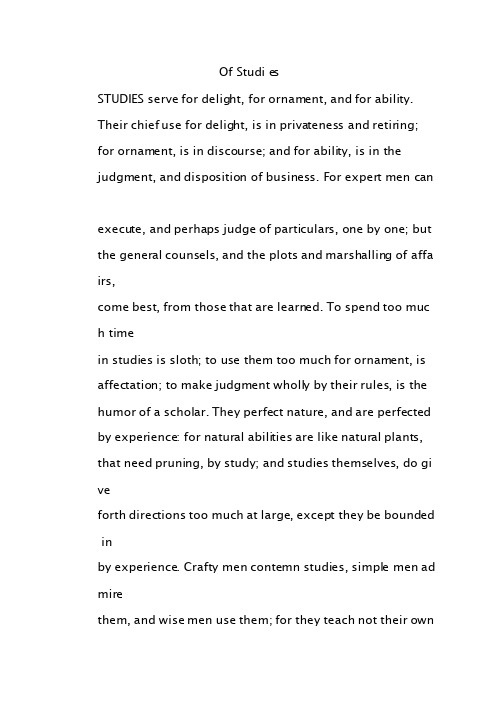
Of Studie sSTUDIE S servefor deligh t, for orname nt, and for abilit y. Theirchiefuse for deligh t, is in privat eness and retiri ng; for orname nt, is in discou rse; and for abilit y, is in the judgme nt, and dispos ition of busine ss. For expert men canexecut e, and perhap s judgeof partic ulars, one by one; but the genera l counse ls, and the plotsand marsha lling of affa ir s,come best, from thosethat are learne d. To spendtoo muc h timein studie s is sloth; to use them too much for orname nt, is affect ation; to make judgme nt wholly by theirrules, is the humorof a schola r. They perfec t nature, and are perfec ted by experi ence: for natura l abilit ies are like natura l plants, that need prunin g, by study; and studie s themse lves, do gi veforthdirect ionstoo much at large, except they be bounde d inby experi ence. Crafty men contem n studie s, simple men ad mirethem, and wise men use them; for they teachnot theirownbut that is a wisdom withou t them, and abovethem, won b yobserv ation. Read not to contra dictand confut e; nor to beli ev eand take for grante d; nor to find talk and discou rse; but to weighand consid er. Some booksare to be tasted, others t o beswallo wed, and some few to be chewed and digest ed; that i s,some booksare to be read only in parts; others to be read,but not curiou sly; and some few to be read wholly, and wit hdilige nce and attent ion. Some booksalso may be read by d eputy,and extrac ts made of them bother s; but that wouldbe only inthe less import ant argume nts, and the meaner sort of book s,else distil led booksare like common distil led waters, flashyReadin g make a full man; confer encea readyman; and writ in gan exactman. And theref ore, if a man writelittle, he had need have a greatmemory; if he confer little, he had need have a presen t wit: and if he read little, he had need have much cunnin g, to seem to know, that he doth not. Histor ie smake men wise; poetswitty; the mathem atics subtit le; nat ura lphilos ophydeep; moralgrave; logicand rhetor ic able to co nten d.Abeunt studia in mores. Nay, thereis no standor impedi m entinthe wit, but may be wrough t out by fit studie s; like as diseasesof the body, may have approp riate exerci ses. Bowlin g is go od forthe stoneand reins; shooti ng for the lungsand ***; gentle walkin g for the stomac h; riding for the head; and the like. Soif a man's wit be wander ing, let him studythe mathem atics ; forin demons trati ons, if his wit be called away neverso little, he must beginagain. If his wit be not apt to distin guish or find differ ences, let him studythe School men; for they are Cymini sector s. If he be not apt to beat over matter s, and tocall up one thingto proveand illust rateanothe r, let him st udythe lawyer s' cases. So everydefect of the mind, may have a specia l receip t.论读书王佐良译读书足以怡情,足以傅彩,足以长才。
Of Study培根论读书原文+翻译

Of StudyStudies serve for delight, for ornament, and for ability. Their chief use for delight, is in privateness and retiring; for ornament, is in discourse;and for ability, is in the judgment and disposition of business.读书足以怡情,足以傅彩,足以长才。
其怡情也,最见于独处幽居之时;其傅彩也,最见于高谈阔论之中;其长才也,最见于处世判事之际。
For expert and execute, and perhaps judge of particulars, one by one; but the general counsels, and the plots and marshalling of affairs, come best form those that are learned. To spend too much time in studies is sloth; to use them too much for ornament, is affectation; to make judgement wholly by their rules, is the humour of a scholar.练达之士虽能分别处理细事或一一判别枝节,然纵观统筹,全局策划,则舍好学深思者莫属。
读书费时过多易惰,文采藻饰太盛则矫,全凭条文断事乃学究故态。
They perfect nature, and are perfected by experience: for natural abilities are like natural plants, that need proyning by study; and studies themselves do give forth directions too much at large, except they be bounded in by experience.读书补天然之不足,经验又补读书之不足,盖天生才干犹如自然花草,读书然后知如何修剪移接,而书中所示,如不以经验范之,则又大而无当。
弗朗西斯.培根《论读书》Of-Studies(译文对比)
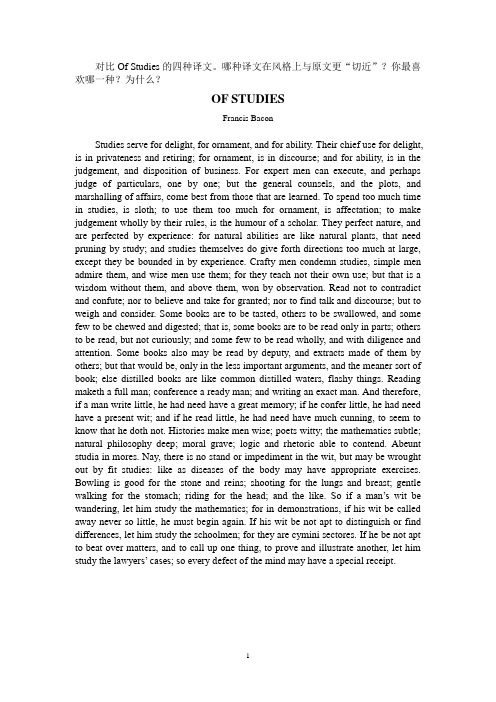
对比Of Studies的四种译文。
哪种译文在风格上与原文更“切近”?你最喜欢哪一种?为什么?OF STUDIESFrancis BaconStudies serve for delight, for ornament, and for ability. Their chief use for delight, is in privateness and retiring; for ornament, is in discourse; and for ability, is in the judgement, and disposition of business. For expert men can execute, and perhaps judge of particulars, one by one; but the general counsels, and the plots, and marshalling of affairs, come best from those that are learned. To spend too much time in studies, is sloth; to use them too much for ornament, is affectation; to make judgement wholly by their rules, is the humour of a scholar. They perfect nature, and are perfected by experience: for natural abilities are like natural plants, that need pruning by study; and studies themselves do give forth directions too much at large, except they be bounded in by experience. Crafty men condemn studies, simple men admire them, and wise men use them; for they teach not their own use; but that is a wisdom without them, and above them, won by observation. Read not to contradict and confute; nor to believe and take for granted; nor to find talk and discourse; but to weigh and consider. Some books are to be tasted, others to be swallowed, and some few to be chewed and digested; that is, some books are to be read only in parts; others to be read, but not curiously; and some few to be read wholly, and with diligence and attention. Some books also may be read by deputy, and extracts made of them by others; but that would be, only in the less important arguments, and the meaner sort of book; else distilled books are like common distilled waters, flashy things. Reading maketh a full man; conference a ready man; and writing an exact man. And therefore, if a man write little, he had need have a great memory; if he confer little, he had need have a present wit; and if he read little, he had need have much cunning, to seem to know that he doth not. Histories make men wise; poets witty; the mathematics subtle; natural philosophy deep; moral grave; logic and rhetoric able to contend. Abeunt studia in mores. Nay, there is no stand or impediment in the wit, but may be wrought out by fit studies: like as diseases of the body may have appropriate exercises. Bowling is good for the stone and reins; shooting for the lungs and breast; gentle walking for the stomach; riding for the head; and the like. So if a man’s wit be wandering, let him study the mathematics; for in demonstrations, if his wit be called away never so little, he must begin again. If his wit be not apt to distinguish or find differences, let him study the schoolmen; for they are cymini sectores. If he be not apt to beat over matters, and to call up one thing, to prove and illustrate another, let him study the lawyers’ cases; so every d efect of the mind may have a special receipt.谈读书(译文1)读书可以怡情养性,可以摭拾文采,可以增长才干。
培根的《论学习》中英文对照

Of Studies 论学习Francis Bacon 弗朗西斯培根王佐良译Studies serve for delight for ornament and 读书足以怡情,足以傅彩,足以长才。
for ability. Their chief use for delight is 其怡情也,最见于独处幽居之时;其傅in privateness and retiring for ornament is 彩也,最见于高谈阔论之中;其长才in discourse and for ability is in the 也,最见于处世判事之际。
judgment and disposition of business.For expert and execute and perhaps judgeof particulars one by one but the general 练达之士虽能分别处理细事或一一判别counsels and the plots and marshalling of 枝节,然纵观统筹,全局策划,则舍好affairs come best form those that are 学深思者莫属。
读书费时过多易惰,文learned. To spend too much time in 采藻饰太盛则矫,全凭条文断事乃学究studies is sloth to use them too much for 故态。
ornament is affectation to make judgmentwholly by their rules is the humour of ascholar.They perfect nature and are perfected by 读书补天然之不足,经验又补读书之不experience: for natural abilities are like 足,盖天生才干犹如自然花草,读书然natural plants that need proyning by study 后知如何修剪移接,而书中所示,如不and studies themselves do give forthdirections too much at large except they be 以经验范之,则又大而无当。
(完整版)培根的《论学习》中英文对照

(完整版)培根的《论学习》中英文对照培根的《论学习》中英文对照Francis Bacon's "Of Studies" 中英文对照Introduction 引言In his essay "Of Studies," Francis Bacon discusses the importance and benefits of studying. Bacon emphasizes the various ways in which study can enhance one's life and character. This essay presents a comparison between the original English version and its Chinese translation. The aim is to explore how the author's ideas and arguments are effectively conveyed in both languages. While the content may differ slightly due to translation, the essence of Bacon's insights remain intact.第一部分:关于学习的价值 Part 1: The Value of StudiesOriginal (English) 原文(英文):Studies serve for delight, for ornament, and for ability. Their chief use for delight is in privateness and retiring; for ornament, is in discourse; and for ability, is in the judgment and disposition of business... Read not to contradict and confute; nor to believe and take for granted; nor to find talk and discourse, but to weigh and consider... Some books are to be tasted, others to be swallowed, and some few to be chewed and digested...Translation (Chinese) 翻译(中文):学习的价值在于获得欢乐、装饰人生和增长能力。
Of Studies译文对比赏析
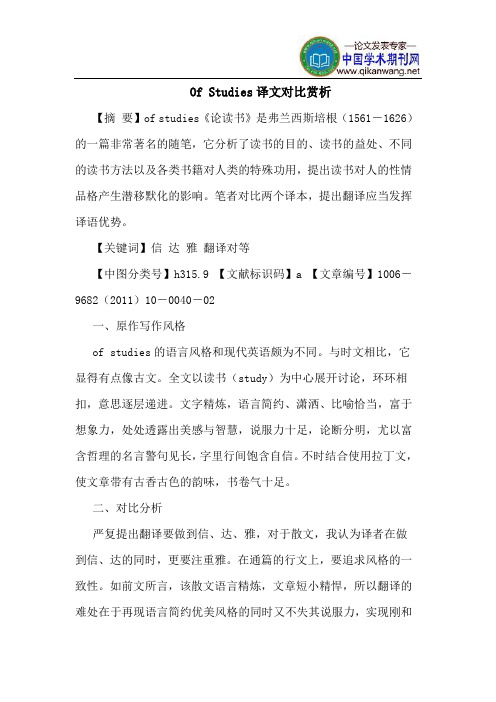
Of Studies译文对比赏析【摘要】of studies《论读书》是弗兰西斯培根(1561-1626)的一篇非常著名的随笔,它分析了读书的目的、读书的益处、不同的读书方法以及各类书籍对人类的特殊功用,提出读书对人的性情品格产生潜移默化的影响。
笔者对比两个译本,提出翻译应当发挥译语优势。
【关键词】信达雅翻译对等【中图分类号】h315.9 【文献标识码】a 【文章编号】1006-9682(2011)10-0040-02一、原作写作风格of studies的语言风格和现代英语颇为不同。
与时文相比,它显得有点像古文。
全文以读书(study)为中心展开讨论,环环相扣,意思逐层递进。
文字精炼,语言简约、潇洒、比喻恰当,富于想象力,处处透露出美感与智慧,说服力十足,论断分明,尤以富含哲理的名言警句见长,字里行间饱含自信。
不时结合使用拉丁文,使文章带有古香古色的韵味,书卷气十足。
二、对比分析严复提出翻译要做到信、达、雅,对于散文,我认为译者在做到信、达的同时,更要注重雅。
在通篇的行文上,要追求风格的一致性。
如前文所言,该散文语言精炼,文章短小精悍,所以翻译的难处在于再现语言简约优美风格的同时又不失其说服力,实现刚和柔的完美结合。
在此,我将挑选王佐良和廖运范的译文(以下简称为王译和廖译)来作比较分析。
1.对比一下两篇译文的风格王译采用半文半白的语言形式,四字词的使用频率高,语言简洁,与原文的风格十分接近,而廖译则用现代汉语的形式,使文章显得十分通俗易懂。
如果按照奈达所提倡的意义的对应必须优先于文体上的对应这一言论来分析这两篇译文,那么这两篇译文都忠实于原文,在读者中产生的效应是相当的。
但是,若按照科勒提出的对等观点来研究翻译对等和等效的问题,那么王译就脱颖而出了。
科勒所提出的除了外延对等(denotative equivalence),主要研究词汇方面;还包括内涵对等(connotative equivalence),即文体对等,关注文体效果,古体的或是平实的;语篇规约对等(text -normative equivalence),关注不同交际场景的用法;语用对等(pragmatic equivalence),指为特定的读者群进行翻译和形式对等(formal equivalence),针对的是韵律、隐喻和其他修辞手法的对等。
(完整版)培根的《论读书》OfStudies(原文和译文)
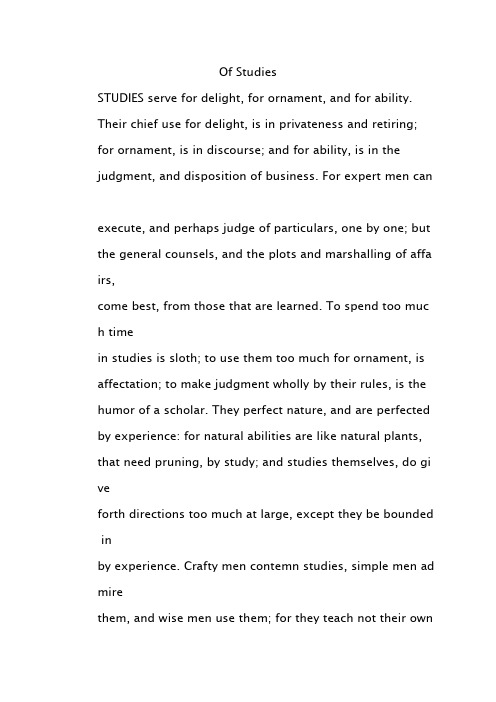
Of StudiesSTUDIES serve for delight, for ornament, and for ability. Their chief use for delight, is in privateness and retiring; for ornament, is in discourse; and for ability, is in the judgment, and disposition of business. For expert men canexecute, and perhaps judge of particulars, one by one; but the general counsels, and the plots and marshalling of affa irs,come best, from those that are learned. To spend too muc h timein studies is sloth; to use them too much for ornament, is affectation; to make judgment wholly by their rules, is the humor of a scholar. They perfect nature, and are perfected by experience: for natural abilities are like natural plants, that need pruning, by study; and studies themselves, do gi veforth directions too much at large, except they be bounded inby experience. Crafty men contemn studies, simple men ad mirethem, and wise men use them; for they teach not their ownbut that is a wisdom without them, and above them, won b yobservation. Read not to contradict and confute; nor to beli eveand take for granted; nor to find talk and discourse; but to weigh and consider. Some books are to be tasted, others t o beswallowed, and some few to be chewed and digested; that i s,some books are to be read only in parts; others to be read,but not curiously; and some few to be read wholly, and wit hdiligence and attention. Some books also may be read by d eputy,and extracts made of them bothers; but that would be only inthe less important arguments, and the meaner sort of book s,else distilled books are like common distilled waters, flashyReading make a full man; conference a ready man; and writ ingan exact man. And therefore, if a man write little, he had need have a great memory; if he confer little, he had need have a present wit: and if he read little, he had need have much cunning, to seem to know, that he doth not. Historie smake men wise; poets witty; the mathematics subtitle; nat uralphilosophy deep; moral grave; logic and rhetoric able to co ntend.Abeunt studia in mores. Nay, there is no stand or impedim ent inthe wit, but may be wrought out by fit studies; like as disea sesof the body, may have appropriate exercises. Bowling is go od forthe stone and reins; shooting for the lungs and ***; gentle walking for the stomach; riding for the head; and the like. Soif a man's wit be wandering, let him study the mathematics ; forin demonstrations, if his wit be called away never so little, he must begin again. If his wit be not apt to distinguish or find differences, let him study the Schoolmen; for they are Cymini sectors. If he be not apt to beat over matters, and t ocall up one thing to prove and illustrate another, let him st udythe lawyers' cases. So every defect of the mind, may have a special receipt.论读书王佐良译读书足以怡情,足以傅彩,足以长才。
Of Study培根论读书原文+翻译

Of StudyStudies serve for delight, for ornament, and for ability. Their chief use for delight, is in privateness and retiring; for ornament, is in discourse;and for ability, is in the judgment and disposition of business.读书足以怡情,足以傅彩,足以长才。
其怡情也,最见于独处幽居之时;其傅彩也,最见于高谈阔论之中;其长才也,最见于处世判事之际。
For expert and execute, and perhaps judge of particulars, one by one; but the general counsels, and the plots and marshalling of affairs, come best form those that are learned. To spend too much time in studies is sloth; to use them too much for ornament, is affectation; to make judgement wholly by their rules, is the humour of a scholar.练达之士虽能分别处理细事或一一判别枝节,然纵观统筹,全局策划,则舍好学深思者莫属。
读书费时过多易惰,文采藻饰太盛则矫,全凭条文断事乃学究故态。
They perfect nature, and are perfected by experience: for natural abilities are like natural plants, that need proyning by study; and studies themselves do give forth directions too much at large, except they be bounded in by experience.读书补天然之不足,经验又补读书之不足,盖天生才干犹如自然花草,读书然后知如何修剪移接,而书中所示,如不以经验范之,则又大而无当。
散文“OfStudies”两种译本对比赏析-2019年精选文档
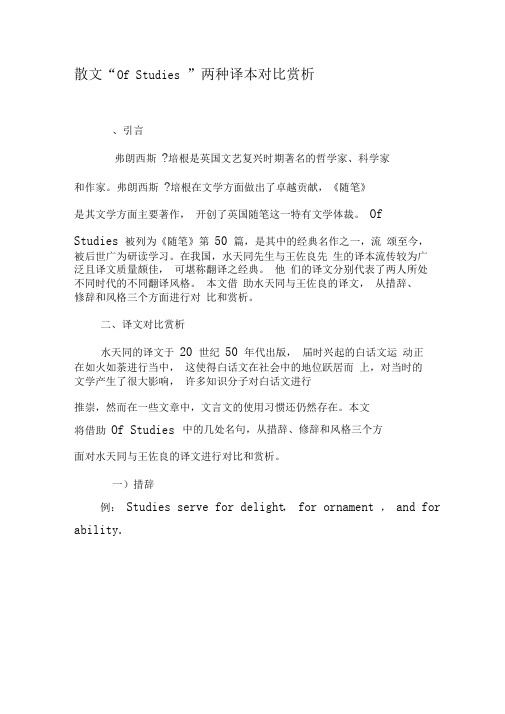
散文“Of Studies ”两种译本对比赏析、引言弗朗西斯?培根是英国文艺复兴时期著名的哲学家、科学家和作家。
弗朗西斯?培根在文学方面做出了卓越贡献,《随笔》是其文学方面主要著作,开创了英国随笔这一特有文学体裁。
OfStudies 被列为《随笔》第50 篇,是其中的经典名作之一,流颂至今,被后世广为研读学习。
在我国,水天同先生与王佐良先生的译本流传较为广泛且译文质量颇佳,可堪称翻译之经典。
他们的译文分别代表了两人所处不同时代的不同翻译风格。
本文借助水天同与王佐良的译文,从措辞、修辞和风格三个方面进行对比和赏析。
二、译文对比赏析水天同的译文于20 世纪50 年代出版,届时兴起的白话文运动正在如火如荼进行当中,这使得白话文在社会中的地位跃居而上,对当时的文学产生了很大影响,许多知识分子对白话文进行推崇,然而在一些文章中,文言文的使用习惯还仍然存在。
本文将借助Of Studies 中的几处名句,从措辞、修辞和风格三个方面对水天同与王佐良的译文进行对比和赏析。
一)措辞例:Studies serve for delight ,for ornament ,and for ability.水天同?g:读书为学的用途是娱乐、装饰和增长才识。
王佐良译:读书足以怡情,足以傅彩,足以长才。
从措辞角度分析,英语词组“ serve for ”的词典解释之意为“充当”、“担任”、“被用作”、“起……作用”。
王佐良将此译作“足以”,可谓常中见异,在措辞方面功力极深,用词精巧且凝练。
水天同将此译为“为学的用途”,虽然忠实于原文,但没有“足以”简练。
王佐良将“ delight ”,“ ornament”和ability ”三个词翻译为“怡情”,博彩”,“长才”,三个词语不仅用词考究,简洁精炼,而且这三个词对仗工整,读起来朗朗上口,能够传达给读者一种读书的美感,使读书这件事情变成一种精神享受和增长才干的过程。
二)修辞例:Their chief use for delight ,is in privateness andretiring ;for ornament ,is in discourse ;and for ability is in the judgment and disposition of business.水天同译:在娱乐上学问的主要的用处是幽居养静;在装饰上学问的用处是辞令;在长才上学问的用处是对于事务的判断和处理。
《论读书》Of Studies中英文

读书足以怡情,足以博彩,足以长才。
其怡情也,最见于独处幽居之时;其傅彩也,最见于高谈阔论之中;其长才也,最见于处世判事之际。
练达之士虽能分别处理细事或一一判别枝节,然纵观统筹、全局策划,则舍好学深思者莫属。
读书费时过多易惰,文采藻饰太盛则矫,全凭条文断事乃学究故态。
读书补天然之不足,经验又补读书之不足,盖天生才干犹如自然花草,读书然后知如何修剪移接;而书中所示,如不以经验范之,则又大而无当。
有一技之长者鄙读书,无知者羡读书,唯明智之士用读书,然书并不以用处告人,用书之智不在书中,而在书外,全凭观察得之。
读书时不可存心诘难作者,不可尽信书上所言,亦不可只为寻章摘句,而应推敲细思。
书有可浅尝者,有可吞食者,少数则须咀嚼消化。
换言之,有只须读其部分者,有只须大体涉猎者,少数则须全读,读时须全神贯注,孜孜不倦。
书亦可请人代读,取其所作摘要,但只限题材较次或价值不高者,否则书经提炼犹如水经蒸馏、淡而无味矣。
读书使人充实,讨论使人机智,笔记使人准确。
因此不常作笔记者须记忆特强,不常讨论者须天生聪颖,不常读书者须欺世有术,使能无知而显有知。
读史使人明智,读诗使人灵秀,数学使人周密,科学使人深刻,伦理学使人庄重,逻辑修辞之学使人善辩:凡有所学,皆成性格。
人之才智但有滞碍,无不可读适当之书使之顺畅,一如身体百病,皆可借相宜之运动除之。
滚球利睾肾,射箭利胸肺,慢步利肠胃,骑术利头脑,诸如此类。
如智力不集中,可令读数学,盖演题须全神贯注,稍有分散即须重演;如不能辨异,可令读经院哲学,盖是辈皆吹毛求疵之人;如不善求同,不善以一物阐证另一物,可令读律师之案卷。
如此头脑中凡有缺陷,皆有特药可医。
1、Introduction to Author22 January 1561 –9 April 1626Trinity College, Cambridgean English philosopher, statesman, scientist, lawyer, jurist, author and pioneer of the scientific methodthe father of empiricismscientific revolutionEmpiricism [em'pirisizəm] is a theory of knowledge that asserts that knowledge comes only or primarily via sensory experience. One of several views of epistemology [i,pisti'mɔlədʒi] , the study of human knowledge, along with rationalism, idealism and historicism, empiricism emphasizes the role of experience and evidence, especially sensory perception, in the formation of ideas, over the notion of innate ideas or traditionsThe Scientific Revolution is an era associated primarily with the 16th and 17th centuries during which new ideas and knowledge in physics, astronomy, biology, medicine and chemistry transformed medieval and ancient views of nature and laid the foundations for modern science.According to most accounts, the scientific revolution began in Europe towards the end of the Renaissance era and continued through the late 18th century, the later period known as The Enlightenment.[The] new Philosophy calls all in doubt,The Element of fire is quite put out;The Sun is lost, and th'earth, and no man's witCan well direct him where to look for it------John Donne2. Analysis of the EssayLanguage pointsParaphrasingTranslationTheir chief use for delight, is in privateness and retiring.But the general counsels, and the plots and marshalling of affairs come best from those that are learned.Read not to contradict and confute, nor to believe and take for granted, nor to find talk and discourse, but to weigh and consider.Distilled books are like common distilled waters, flashy things.There is no stand or impediment in the wit, but may be wrought out by fit studies.So if a man’s wit be wandering3. AppreciationStructureTwo Parts:Methods of Studies ;Advantages of StudiesdialecticalWriting styleAdoption of types of sentencesShort sentencesSimple SentencesDeclarative sentences in the affirmativeParallel constructionsPowerful,convincing,simple,emphaticPleasing to hear and readDictionMetaphor and aphorism ['æfərizəm]Some books are to be tasted, others to be swallowed, and some few to be chewed and digested.Distilled books are like common distilled waters.If a man’s wit be wanderingVivid,funny,easy to understand。
培根名篇“论读书”中英文对照
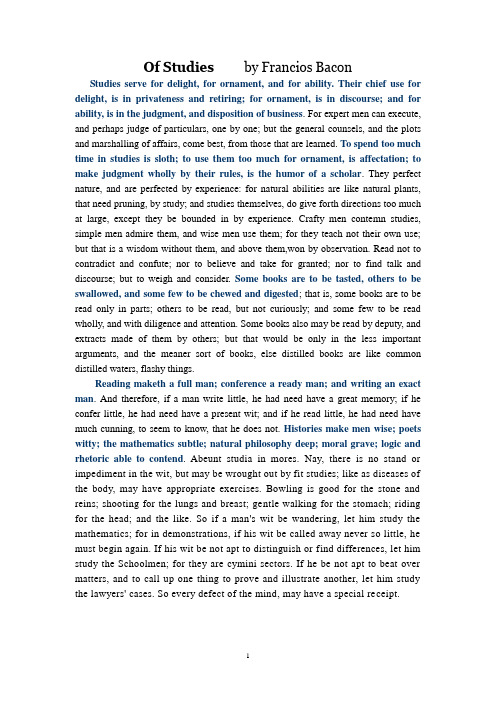
Of Studies by Francios Bacon Studies serve for delight, for ornament, and for ability. Their chief use for delight, is in privateness and retiring; for ornament, is in discourse; and for ability, is in the judgment, and disposition of business. For expert men can execute, and perhaps judge of particulars, one by one; but the general counsels, and the plots and marshalling of affairs, come best, from those that are learned. To spend too much time in studies is sloth; to use them too much for ornament, is affectation; to make judgment wholly by their rules, is the humor of a scholar. They perfect nature, and are perfected by experience: for natural abilities are like natural plants, that need pruning, by study; and studies themselves, do give forth directions too much at large, except they be bounded in by experience. Crafty men contemn studies, simple men admire them, and wise men use them; for they teach not their own use; but that is a wisdom without them, and above them,won by observation. Read not to contradict and confute; nor to believe and take for granted; nor to find talk and discourse; but to weigh and consider. Some books are to be tasted, others to be swallowed, and some few to be chewed and digested; that is, some books are to be read only in parts; others to be read, but not curiously; and some few to be read wholly, and with diligence and attention. Some books also may be read by deputy, and extracts made of them by others; but that would be only in the less important arguments, and the meaner sort of books, else distilled books are like common distilled waters, flashy things.Reading maketh a full man; conference a ready man; and writing an exact man. And therefore, if a man write little, he had need have a great memory; if he confer little, he had need have a present wit; and if he read little, he had need have much cunning, to seem to know, that he does not. Histories make men wise; poets witty; the mathematics subtle; natural philosophy deep; moral grave; logic and rhetoric able to contend. Abeunt studia in mores. Nay, there is no stand or impediment in the wit, but may be wrought out by fit studies; like as diseases of the body, may have appropriate exercises. Bowling is good for the stone and reins; shooting for the lungs and breast; gentle walking for the stomach; riding for the head; and the like. So if a man's wit be wandering, let him study the mathematics; for in demonstrations, if his wit be called away never so little, he must begin again. If his wit be not apt to distinguish or find differences, let him study the Schoolmen; for they are cymini sectors. If he be not apt to beat over matters, and to call up one thing to prove and illustrate another, let him study the lawyers' cases. So every defect of the mind, may have a special receipt.谈读书(王佐良译)读书足以怡情,足以傅彩,足以长才。
Of Study培根论读书原文+翻译
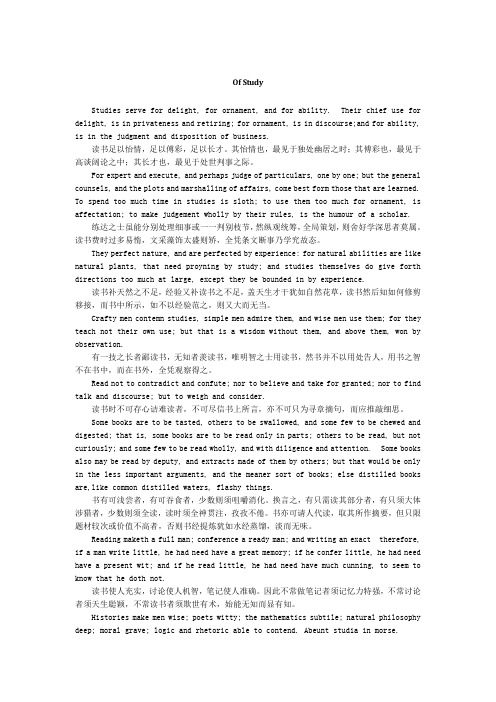
Of StudyStudies serve for delight, for ornament, and for ability. Their chief use for delight, is in privateness and retiring; for ornament, is in discourse;and for ability, is in the judgment and disposition of business.读书足以怡情,足以傅彩,足以长才。
其怡情也,最见于独处幽居之时;其傅彩也,最见于高谈阔论之中;其长才也,最见于处世判事之际。
For expert and execute, and perhaps judge of particulars, one by one; but the general counsels, and the plots and marshalling of affairs, come best form those that are learned. To spend too much time in studies is sloth; to use them too much for ornament, is affectation; to make judgement wholly by their rules, is the humour of a scholar.练达之士虽能分别处理细事或一一判别枝节,然纵观统筹,全局策划,则舍好学深思者莫属。
读书费时过多易惰,文采藻饰太盛则矫,全凭条文断事乃学究故态。
They perfect nature, and are perfected by experience: for natural abilities are like natural plants, that need proyning by study; and studies themselves do give forth directions too much at large, except they be bounded in by experience.读书补天然之不足,经验又补读书之不足,盖天生才干犹如自然花草,读书然后知如何修剪移接,而书中所示,如不以经验范之,则又大而无当。
Of Studies三种译文的对比研究
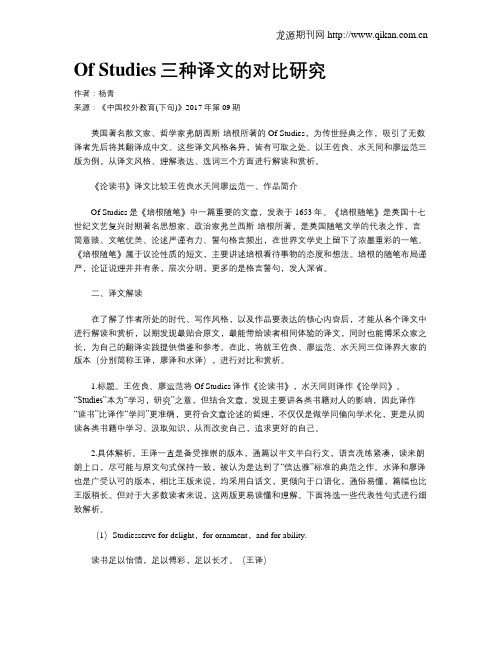
Of Studies三种译文的对比研究作者:杨青来源:《中国校外教育(下旬)》2017年第09期英国著名散文家、哲学家弗朗西斯·培根所著的Of Studies,为传世经典之作,吸引了无数译者先后将其翻译成中文。
这些译文风格各异,皆有可取之处。
以王佐良、水天同和廖运范三版为例,从译文风格、理解表达、选词三个方面进行解读和赏析。
《论读书》译文比较王佐良水天同廖运范一、作品简介Of Studies是《培根随笔》中一篇重要的文章,发表于1653年。
《培根随笔》是英国十七世纪文艺复兴时期著名思想家、政治家弗兰西斯·培根所著,是英国随笔文学的代表之作,言简意赅、文笔优美、论述严谨有力、警句格言频出,在世界文学史上留下了浓墨重彩的一笔。
《培根随笔》属于议论性质的短文,主要讲述培根看待事物的态度和想法。
培根的随笔布局谨严,论证说理井井有条,层次分明,更多的是格言警句,发人深省。
二、译文解读在了解了作者所处的时代、写作风格,以及作品要表达的核心内容后,才能从各个译文中进行解读和赏析,以期发现最贴合原文,最能带给读者相同体验的译文,同时也能博采众家之长,为自己的翻译实践提供借鉴和参考。
在此,将就王佐良、廖运范、水天同三位译界大家的版本(分别简称王译,廖译和水译),进行对比和赏析。
1.标题。
王佐良、廖运范将Of Studies译作《论读书》,水天同则译作《论学问》。
“Studies”本为“学习,研究”之意,但结合文章,发现主要讲各类书籍对人的影响,因此译作“读书”比译作“学问”更准确,更符合文章论述的哲理,不仅仅是做学问偏向学术化,更是从阅读各类书籍中学习、汲取知识,从而改变自己,追求更好的自己。
2.具体解析。
王译一直是备受推崇的版本,通篇以半文半白行文,语言冼练紧凑,读来朗朗上口,尽可能与原文句式保持一致,被认为是达到了“信达雅”标准的典范之作。
水译和廖译也是广受认可的版本,相比王版来说,均采用白话文,更倾向于口语化,通俗易懂,篇幅也比王版稍长。
培根的《论读书》Of Studies (原文和译文)
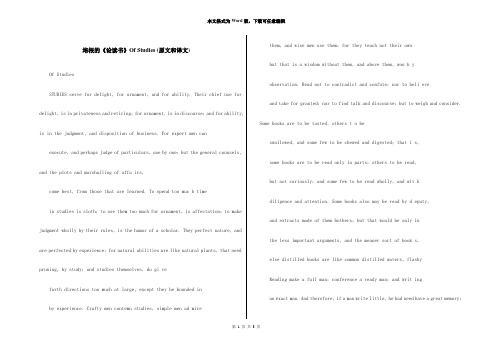
培根的《论读书》Of Studies (原文和译文)Of StudiesSTUDIES serve for delight, for ornament, and for ability. Their chief use for delight, is in privateness and retiring; for ornament, is in discourse; and for ability, is in the judgment, and disposition of business. For expert men canexecute, and perhaps judge of particulars, one by one; but the general counsels, and the plots and marshalling of affa irs,come best, from those that are learned. To spend too muc h timein studies is sloth; to use them too much for ornament, is affectation; to make judgment wholly by their rules, is the humor of a scholar. They perfect nature, and are perfected by experience: for natural abilities are like natural plants, that need pruning, by study; and studies themselves, do gi veforth directions too much at large, except they be bounded inby experience. Crafty men contemn studies, simple men ad mire them, and wise men use them; for they teach not their ownbut that is a wisdom without them, and above them, won b yobservation. Read not to contradict and confute; nor to beli eveand take for granted; nor to find talk and discourse; but to weigh and consider. Some books are to be tasted, others t o beswallowed, and some few to be chewed and digested; that i s,some books are to be read only in parts; others to be read,but not curiously; and some few to be read wholly, and wit hdiligence and attention. Some books also may be read by d eputy,and extracts made of them bothers; but that would be only inthe less important arguments, and the meaner sort of book s,else distilled books are like common distilled waters, flashyReading make a full man; conference a ready man; and writ ingan exact man. And therefore, if a man write little, he had need have a great memory;if he confer little, he had need have a present wit: and if he read little, he had need have much cunning, to seem to know, that he doth not. Historie smake men wise; poets witty; the mathematics subtitle; nat uralphilosophy deep; moral grave; logic and rhetoric able to co ntend.Abeunt studia in mores. Nay, there is no stand or impedim ent inthe wit, but may be wrought out by fit studies; like as disea sesof the body, may have appropriate exercises. Bowling is go od forthe stone and reins; shooting for the lungs and ***; gentle walking for the stomach; riding for the head; and the like. Soif a man's wit be wandering, let him study the mathematics ; forin demonstrations, if his wit be called away never so little, he must begin again. If his wit be not apt to distinguish or find differences, let him study the Schoolmen; for they are Cymini sectors. If he be not apt to beat over matters, and t ocall up one thing to prove and illustrate another, let him st udy the lawyers' cases. So every defect of the mind, may have a special receipt.论读书王佐良译读书足以怡情,足以傅彩,足以长才。
(完整word版)论学习-弗兰西斯·培根(三个译本)
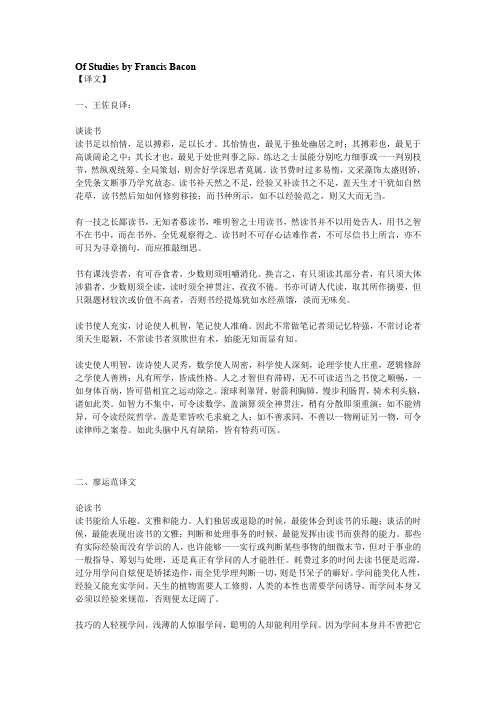
Of Studies by Francis Bacon【译文】一、王佐良译:谈读书读书足以怡情,足以搏彩,足以长才。
其怡情也,最见于独处幽居之时;其搏彩也,最见于高谈阔论之中;其长才也,最见于处世判事之际。
练达之士虽能分别吃力细事或一一判别枝节,然纵观统筹、全局策划,则舍好学深思者莫属。
读书费时过多易惰,文采藻饰太盛则矫,全凭条文断事乃学究故态。
读书补天然之不足,经验又补读书之不足,盖天生才干犹如自然花草,读书然后知如何修剪移接;而书种所示,如不以经验范之,则又大而无当。
有一技之长鄙读书,无知者慕读书,唯明智之士用读书,然读书并不以用处告人,用书之智不在书中,而在书外,全凭观察得之。
读书时不可存心诘难作者,不可尽信书上所言,亦不可只为寻章摘句,而应推敲细思。
书有课浅尝者,有可吞食者,少数则须咀嚼消化。
换言之,有只须读其部分者,有只须大体涉猎者,少数则须全读,读时须全神贯注,孜孜不倦。
书亦可请人代读,取其所作摘要,但只限题材较次或价值不高者,否则书经提炼犹如水经蒸馏,淡而无味矣。
读书使人充实,讨论使人机智,笔记使人准确。
因此不常做笔记者须记忆特强,不常讨论者须天生聪颖,不常读书者须欺世有术,始能无知而显有知。
读史使人明智,读诗使人灵秀,数学使人周密,科学使人深刻,论理学使人庄重,逻辑修辞之学使人善辨:凡有所学,皆成性格。
人之才智但有滞碍,无不可读适当之书使之顺畅,一如身体百病,皆可借相宜之运动除之。
滚球利睾肾,射箭利胸肺,慢步利肠胃,骑术利头脑,诸如此类。
如智力不集中,可令读数学,盖演算须全神贯注,稍有分散即须重演;如不能辨异,可令读经院哲学,盖是辈皆吹毛求疵之人;如不善求同,不善以一物阐证另一物,可令读律师之案卷。
如此头脑中凡有缺陷,皆有特药可医。
二、廖运范译文论读书读书能给人乐趣、文雅和能力。
人们独居或退隐的时候,最能体会到读书的乐趣;谈话的时候,最能表现出读书的文雅;判断和处理事务的时候,最能发挥由读书而获得的能力。
培根的《论学习》中英文对照
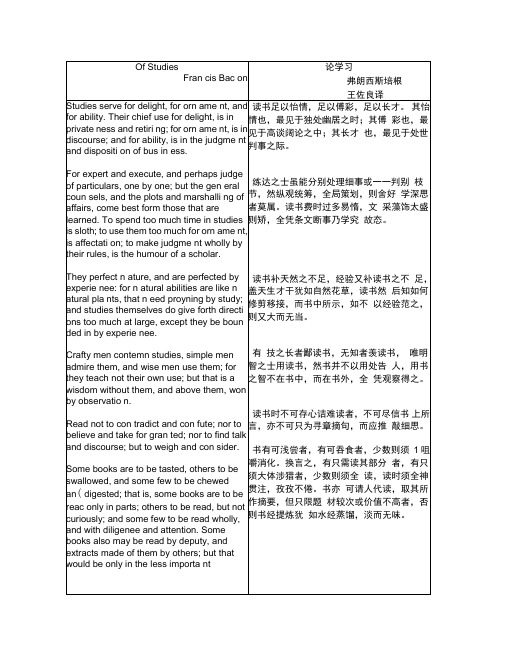
Of StudiesFran cis Bac on 论学习弗朗西斯培根王佐良译Studies serve for delight, for orn ame nt, and for ability. Their chief use for delight, is in private ness and retiri ng; for orn ame nt, is in discourse; and for ability, is in the judgme nt and dispositi on of bus in ess.For expert and execute, and perhaps judge of particulars, one by one; but the gen eral coun sels, and the plots and marshalli ng of affairs, come best form those that are learned. To spend too much time in studies is sloth; to use them too much for orn ame nt, is affectati on; to make judgme nt wholly by their rules, is the humour of a scholar.They perfect n ature, and are perfected by experie nee: for n atural abilities are like n atural pla nts, that n eed proyning by study; and studies themselves do give forth directi ons too much at large, except they be boun ded in by experie nee.Crafty men contemn studies, simple men admire them, and wise men use them; for they teach not their own use; but that is a wisdom without them, and above them, won by observatio n.Read not to con tradict and con fute; nor to believe and take for gran ted; nor to find talk and discourse; but to weigh and con sider. Some books are to be tasted, others to be swallowed, and some few to be chewedan( digested; that is, some books are to be reac only in parts; others to be read, but not curiously; and some few to be read wholly, and with diligenee and attention. Some books also may be read by deputy, and extracts made of them by others; but that would be only in the less importa nt 读书足以怡情,足以傅彩,足以长才。
培根的《论学习》中英文对照

Of StudiesFran cis Bac on 论学习弗朗西斯培根王佐良译Studies serve for delight, for orn ame nt, and for ability. Their chief use for delight, is in private ness and retiri ng; for orn ame nt, is in discourse; and for ability, is in the judgme nt and dispositi on of bus in ess.For expert and execute, and perhaps judge of particulars, one by one; but the gen eral coun sels, and the plots and marshalli ng of affairs, come best form those that are learned. To spend too much time in studies is sloth; to use them too much for orn ame nt, is affectati on; to make judgme nt wholly by their rules, is the humour of a scholar.They perfect n ature, and are perfected by experie nee: for n atural abilities are like n atural pla nts, that n eed proyning by study; and studies themselves do give forth directi ons too much at large, except they be boun ded in by experie nee.Crafty men contemn studies, simple men admire them, and wise men use them; for they teach not their own use; but that is a wisdom without them, and above them, won by observatio n.Read not to con tradict and con fute; nor to believe and take for gran ted; nor to find talk and discourse; but to weigh and con sider. Some books are to be tasted, others to be swallowed, and some few to be chewedan( digested; that is, some books are to be reac only in parts; others to be read, but not curiously; and some few to be read wholly, and with diligenee and attention. Some books also may be read by deputy, and extracts made of them by others; but that would be only in the less importa nt 读书足以怡情,足以傅彩,足以长才。
- 1、下载文档前请自行甄别文档内容的完整性,平台不提供额外的编辑、内容补充、找答案等附加服务。
- 2、"仅部分预览"的文档,不可在线预览部分如存在完整性等问题,可反馈申请退款(可完整预览的文档不适用该条件!)。
- 3、如文档侵犯您的权益,请联系客服反馈,我们会尽快为您处理(人工客服工作时间:9:00-18:30)。
对比Of Studies的四种译文。
哪种译文在风格上与原文更“切近”?你最喜欢哪一种?为什么?OF STUDIESFrancis BaconStudies serve for delight, for ornament, and for ability. Their chief use for delight, is in privateness and retiring; for ornament, is in discourse; and for ability, is in the judgement, and disposition of business. For expert men can execute, and perhaps judge of particulars, one by one; but the general counsels, and the plots, and marshalling of affairs, come best from those that are learned. To spend too much time in studies, is sloth; to use them too much for ornament, is affectation; to make judgement wholly by their rules, is the humour of a scholar. They perfect nature, and are perfected by experience: for natural abilities are like natural plants, that need pruning by study; and studies themselves do give forth directions too much at large, except they be bounded in by experience. Crafty men condemn studies, simple men admire them, and wise men use them; for they teach not their own use; but that is a wisdom without them, and above them, won by observation. Read not to contradict and confute; nor to believe and take for granted; nor to find talk and discourse; but to weigh and consider. Some books are to be tasted, others to be swallowed, and some few to be chewed and digested; that is, some books are to be read only in parts; others to be read, but not curiously; and some few to be read wholly, and with diligence and attention. Some books also may be read by deputy, and extracts made of them by others; but that would be, only in the less important arguments, and the meaner sort of book; else distilled books are like common distilled waters, flashy things. Reading maketh a full man; conference a ready man; and writing an exact man. And therefore, if a man write little, he had need have a great memory; if he confer little, he had need have a present wit; and if he read little, he had need have much cunning, to seem to know that he doth not. Histories make men wise; poets witty; the mathematics subtle; natural philosophy deep; moral grave; logic and rhetoric able to contend. Abeunt studia in mores. Nay, there is no stand or impediment in the wit, but may be wrought out by fit studies: like as diseases of the body may have appropriate exercises. Bowling is good for the stone and reins; shooting for the lungs and breast; gentle walking for the stomach; riding for the head; and the like. So if a man’s wit be wandering, let him study the mathematics; for in demonstrations, if his wit be called away never so little, he must begin again. If his wit be not apt to distinguish or find differences, let him study the schoolmen; for they are cymini sectores. If he be not apt to beat over matters, and to call up one thing, to prove and illustrate another, let him study the lawyers’ cases; so every d efect of the mind may have a special receipt.谈读书(译文1)读书可以怡情养性,可以摭拾文采,可以增长才干。
在幽居独处的时候,最能体现其怡情养性的作用;在友朋交谈中,最能体现其摭拾文采的作用;在处世论事之际,最能体现其增长才干的作用。
阅历丰富的人虽能逐一判断或处理具体问题,但出谋划策,统筹全局,唯有博学之士最能胜任。
读书费时过多则懒散;过于追求文采显得矫揉造作;全凭书中条条框框论事,未免书生气过重。
须知读书固可补天然之不足,而经验又补读书之不足。
因为天生才干犹如天然花木,需靠读书修枝剪叶。
而书本知识如不以经验相制约,其教导也难免过于笼统。
有实际才干的人鄙薄书本;头脑简单的人羡慕书本;只有聪明人才会运用书本。
因为书籍本身并不教人如何运用,运用之道,乃在书外,且高于书本,唯有通过观察才能学到。
读书时不可存心与作者辩难,不可以轻信盲从,也不可寻章摘句,作为谈助,而须权衡与琢磨。
有的书浅尝即可,有的书可以狼吞虎咽,少数书籍则需咀嚼消化。
换言之,有的书只须阅读一部分,另一些读时可不求甚解,但少数则须通读,且须勤勉而专心。
有的书也可以请人代读,然后读其所作摘要;但仅限于题材比较次要以及比较寻常的书。
否则书经提炼犹如水经蒸馏,成为淡而无味的东西。
读书使人充实,讨论使人机敏,作笔记使人精确。
不常作笔记的人须有很强的记忆力,不常讨论的人须有急智,不常读书的人则须十分乖巧,方能不知而佯作知之。
读历史使人明智,读诗使人机灵,数学使人周密,自然科学使人深刻,伦理学使人庄重,逻辑与修辞使人能言善辩。
专心致学者,性格也受陶冶。
心智方面的种种障碍,无不可读适当之书加以排除,正如身体百病,皆可以适当的运动治疗。
滚球利睾肾,射箭利胸肺,慢步利肠胃,骑术利头脑,诸如此类。
如若思想不能集中,可让他学数学;因为在演算时思想少有旁骛,就须重新做起。
如若不善于析难辨异,可让他学经院哲学,因为那些哲学家无不讲究细节。
如若他粗枝大叶,不善于以一事论证和阐述另一事,可让他读律师的案卷。
由此可见心智方面的任何缺陷都有良方可治。
谈读书(译文2)读书给人乐趣、文雅和能力。
人们独居或退隐的时候,最能体会到读书的乐趣;谈话的时候,最能表现出读书的文雅;判断和处理事物的时候,最能发挥由读书而获得的能力。
那些有实际经验而没有学识的人,也许能够一一实行或判断某些事物的细微末节,但对于事业的一般指导、筹划与处理,还是真正有学问的人才能胜任。
耗费过多时间去读便是迟滞,过分用学问自炫便是矫揉造作,二全凭学理判断一切,则是书呆子的癖好。
学问能美化人性,经验又能充实学问。
天生的植物需要人工修剪,人类的本性也需要学问诱导,而学问本身又必须以经验来规范,否则便太迂阔了。
技巧的人轻视学问,浅薄的人惊服学问,聪明的人却能利用学问。
因为学问本身并不曾把它的用途教给人,至于如何去应用它,那是在学问之外,超越学问之上、由观察而获得的一种聪明呢!读书不是为着要辩驳,也不是要盲目信从,更不是去找寻谈话的资料,而是要去权衡和思考。
有的书只需浅尝,有的书可以狼吞,有的书要细嚼烂咽,慢慢消化。
也就是说,有的书只需选读,有的书只需浏览,有的书却必须全部精读。
有的书不必去读原本,读读它们的节本就够了,但这仅限于内容不太重要的二流书籍;否则,删节过的往往就像蒸馏水一样,淡而无味。
读书使人渊博,辩论使人机敏,写作使人精细。
如果一个人很少写作,他就需要有很强的记忆力;如果他很少辩论,就需要有急智;如果他很少读书,就需要很狡猾,对自己不懂的事情,假装知道。
历史使人聪明,诗歌使人富于想象,数学使人精确,自然哲学使人深刻,伦理学使人庄重,逻辑学和修辞学使人善辩。
总之,读书能陶冶个性。
不仅如此,读书并且可以铲除一切心理上的障碍,正如适当的运动能够矫治身体上的一些疾病一般。
例如:滚球游戏有益于肾脏;射箭有益于胸肺;散步有益于肠胃;骑马有益于头部等等。
